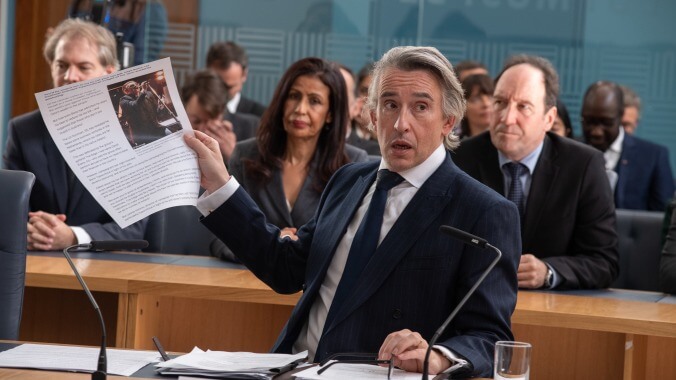Greed, for lack of a better word, is not good

Michael Winterbottom’s Greed basically has one joke, which is, “Can you believe this rich asshole?” The rich asshole in question is British “fast fashion” mogul Sir Richard McCreadie (Steve Coogan), who made his money off the backs of sweatshop laborers but, if asked about it, would chock it up to his cut-throat negotiation tactics. A sleazy entrepreneur molded by unchecked Thatcherism (and modeled on the real British billionaire Phillip Green), McCreadie maintains his obscene wealth through lopsided loan agreements and blatant tax avoidance. He obscures these shady financial practices with a glitzy public image that keeps him in close company with beloved celebrities, even while government inquiries and tabloid press try to spotlight his disreputable behavior. In short, he’s the type of outsized billionaire caricature the public loves to loathe.
It’s not an inherent problem that Greed’s satire can be summed up by the fact that McCreadie rhymes with “McGreedy,” the nickname Coogan’s character wears with pride. Incisive comedy isn’t always stymied by taking broad aim at easy targets. It certainly helps that Coogan can play a McCreadie-like character in his sleep. The actor is on autopilot for much of Greed, leaning heavily on profane invective and a pair of blindingly white false teeth, and he still renders the character compellingly noxious. Thirty years spent playing Alan Partridge will give you that unique ability.
Greed fails because it’s overstuffed with subplots and organized via a maddening time-hopping structure. The main story follows the preparations for McCreadie’s lavish 60th birthday party on the island of Mykonos, but Winterbottom frequently flashes back to both a damaging public inquiry that details his misdeeds and his rise to power from not-so-humble beginnings. These three clumsily navigated timelines ostensibly provide a fuller portrait of McCreadie and the teenage class resentment that fuels his capitalist aims, except their scenes are so scattershot and poorly arranged that they don’t make much impact at all. Worse, Winterbottom’s half-baked presentation sacrifices one of Greed’s most interesting ideas: that McCreadie’s financial success can be most convincingly explained not by his haggling expertise but by an adolescent interest in magic tricks and short cons of the Three-card Monte variety.
On top of that, Winterbottom saddles much of his enormous supporting cast with parallel narratives. Peep Show’s David Mitchell plays McCreadie’s biographer, Nick, whose interviews with friends and family serve as a frame story. But he’s so marginalized by the rest of the film that Greed routinely drops and picks up his thread. McCreadie’s extended family—his ex-wife Samantha (Isla Fisher), his Oedipus complex-afflicted son Finn (Asa Butterfield), his hardbitten mother Margaret (Shirley Henderson), his socialite daughter Lily (Sophie Cookson)—all share the spotlight. There are even more stories involving the disastrous creation of a mini Colosseum for McCreadie’s Gladiator-themed party, a group of Syrian refugees, and one of McCreadie’s assistants, Amanda (Dinita Gohil), whose familial ties to a Sri Lankan sweatshop inspire in her a revolutionary fervor.
Some of the throwaway subplots, such as a reality show following Lily amidst the surrounding chaos or the organizers’ futile attempts to energize a docile lion, are occasionally funny. And Winterbottom does locate some dramatic weight in the idea that proximity to opulence blinds otherwise good, hard-working people from easy moral choices. But there’s literally too much happening at any one moment for most of the comedy or pathos to effectively land; Winterbottom throws everything and the kitchen sink at his premise, eventually attempting to tie together all the dangling threads in a Hail Mary comeuppance for McCreadie. The overkill includes baffling Big Short-style explainers of financial malfeasance, just in case the audience forgets that the real world is filled with men just like this fictional character.
It would be easier to forgive Winterbottom’s penchant for unsubtle comparisons to Greek tragedy or his cheap stabs at sociopolitical topicality if he just stuck to one idea and followed it to the bitter end. Instead, he forfeits all balance and coherence in favor of bloated storytelling that’s broken up by sporadic Armando Iannucci-style zingers, courtesy of The Thick Of It and Veep writer Sean Gray, who’s credited with “additional material.” In fact, one would be better off watching either of those shows, or the similarly themed Succession, for more intelligible satire of power, wealth, and politics. Greed comes too late to the party to stand out.